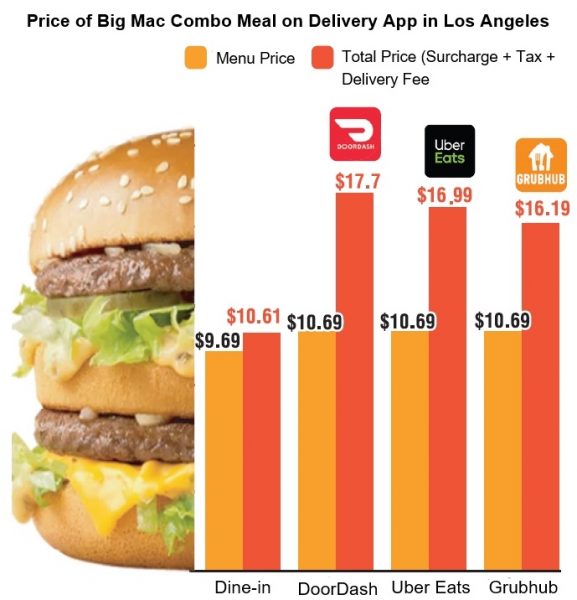With $4.89 for McDonald’s french fries and $2.59 for a Coke, plus a $2.99 delivery fee, $3 service charge, $0.71 sales tax, and $2 tip, the bill comes to $16.18.
Consumers are becoming increasingly frustrated with food delivery, especially with their dual pricing. In some cases, the price of a delivery can be twice as much as the price of a meal at a restaurant.
Customers are complaining about “unfair charges” for using delivery apps, pointing out the higher prices for the same menu items, as well as the service fees and excessive surcharges.
Experts cite multiple reasons for the disparity between the final price of delivery and the store price, including dual pricing, miscellaneous fees charged by the delivery company, and California’s health insurance fee for delivery workers.

As for the dual pricing system, many businesses charge a higher price for delivery of the same food item to pass on the burden of extra fees from the delivery company to the consumer. For example, at a sushi restaurant in Los Angeles Koreatown, a salmon sushi combo costs $18 on a dine-in menu, but the delivery is priced at $23.40, which is $5.40 more expensive. Add in the delivery fee and service fee charged by the app, and the price more than doubles to $36.57. And that’s before tipping, which would make it over $40 including a $3~4 tip.
Customers are also expressing frustration with delivery apps’ excessive service fees. On average, delivery companies charge 15% of the order value. The more expensive the food and the larger the order, the higher the fee. However, ordering less doesn’t mean you’ll be charged less. They also charge a “small order fee” and a “long-distance delivery fee”. Furthermore, California’s recently enacted Prop 22 for ride-hailing and food-delivery app workers’ employee rights imposes a fee from $0.30 to $2 per order to cover minimum wage and health insurance costs.
The complexity of these delivery fees and commissions, coupled with delivery app charges, can make delivery food more than twice as expensive as in-store prices.
At McDonald’s in Los Angeles, a Big Mac combo costs $9.69, but the final bill varies by delivery company. DoorDash, Grubhub, and Uber Eats all charge the same $10.69 price for delivery. However, DoorDash had the most expensive total cost of $17.70 due to its high service and delivery fee. Uber Eats and Grubhub followed at $16.99 and $16.19, respectively. Even just by which app the customers use, the price of the same item varies up to $1.51.
“Delivery apps take about 30% of the food price in fees,” said a restaurant owner in Koreatown who asked for anonymity, “and if we take this fee, we are basically losing money each time we sell something. There’s no other choice but to pass the fee on to the customers.”
BY HAEUN CHUNG, HOONSIK WOO [chung.haeun@koreadaily.com]

![Korean President Yoon Suk Yeol just got ousted. What’s next? President Yoon Suk Yeol attends the opening session of the Ministerial Conference of the Third Summit for Democracy in March last year. The Constitutional Court upheld the National Assembly’s impeachment of Yoon, ousting him from office on April 4. [YONHAP]](https://www.koreadailyus.com/wp-content/uploads/2025/04/0404-Yoon-100x70.jpg)
![Korean President Yoon Suk Yeol ousted from office after unanimous Constitutional Court ruling President Yoon Suk Yeol, right, delivers his closing statement at the 11th and final hearing of his impeachment trial at the Constitutional Court in Jongno District, central Seoul, on Feb. 25. [CONSTITUTIONAL COURT]](https://www.koreadailyus.com/wp-content/uploads/2025/04/0403-impeach-100x70.jpg)
![Clovine accelerates global expansion in collaboration platform market Website of Clovine, a cloud-based project management provider [Screenshot]](https://www.koreadailyus.com/wp-content/uploads/2025/04/0403-clovine-100x70.jpg)
